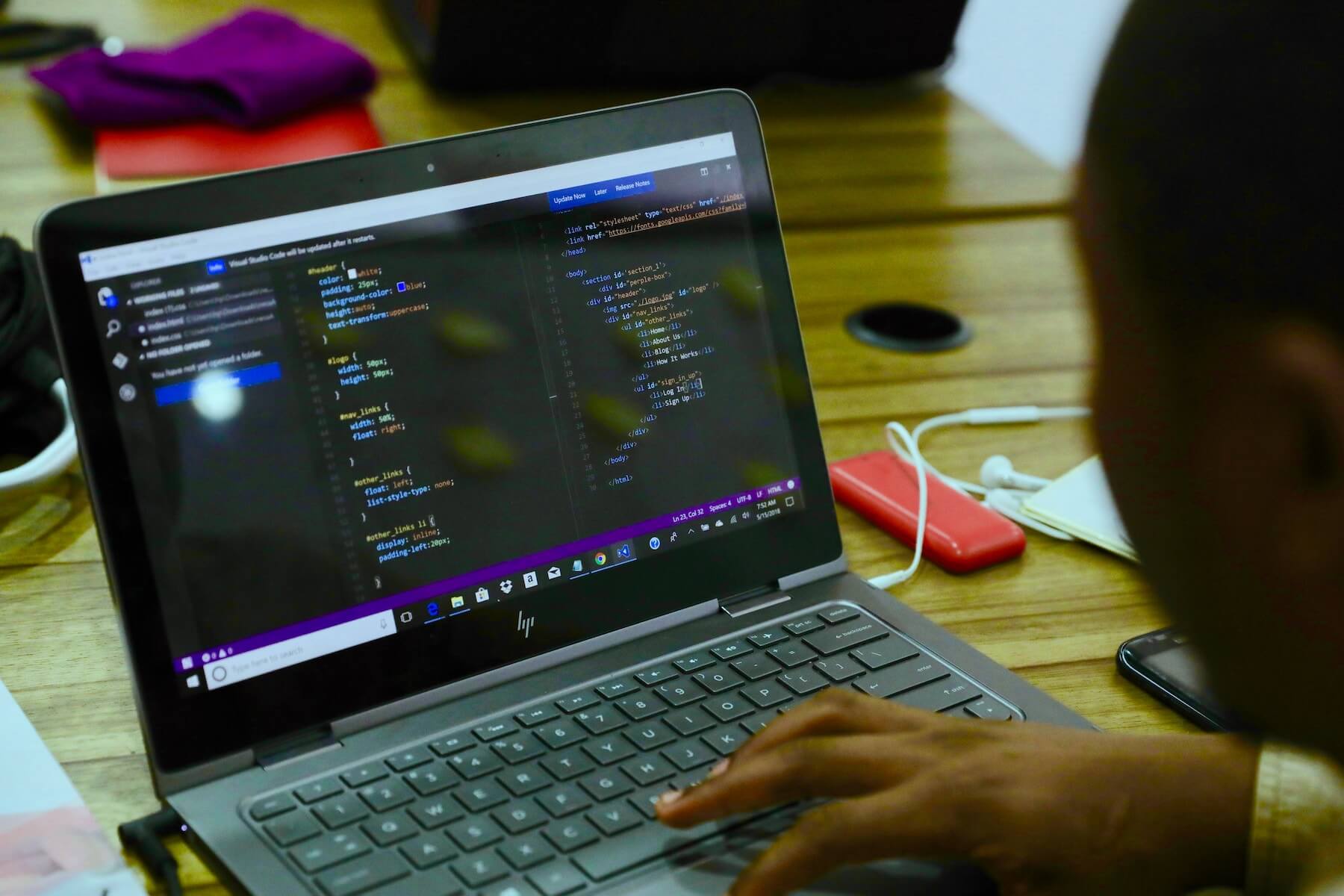One of the fundamental tools in every web developer's arsenal is their PC.
Wait, who am I kidding?
The single most fundamental tool in any web developer's arsenal is their PC — and a large part of that lies in the operating system they choose to work with.
Granted, regardless of your choice of OS, the software your machine is running won't bring you success.
But as a web developer with over 20 years of experience, I believe that it can certainly help. I'll delve further into this point in a bit.
If you're looking to determine which operating system is most likely to work out for you as a web developer, you're in the right place.
I truly believe that the software you have at your disposal can make a huge difference to your work performance and productivity. And in this post, I'm going to explain exactly why, and how.
Keep reading if you're currently trying to decide between Windows, Mac, or Linux for your next personal web development machine.
Naturally, there are so many factors that go into which operating system and type of computer you choose. And that goes for both work and leisure. You've got:
- The cost of the device
- Suitability for your area of expertise as a web developer (are you front-end, back-end, or full-stack?)
- Your hardware requirements
- Your own personal preferrences, experience and proficiency in the operating system
- Support and compatibility for software and applications you might require beyond the OS
First... Thoughts From an Industry Leader
We asked Michael Lakeland, an industry leading freelance web designer and developer for his views.
Michael has worked with some of the biggest name brands and organizations in the world, including BBC Worldwide and Lastminute.com.
Given his feats and successes, we thought we'd ask his thoughts on his operating system of choice for web design and development.
 Having worked with such notable organizations over the course of his career, Michael has significant experience in working with a broad range of software and tools, even to the likes of enterprise level software such as Unity3D and Drupal 8.
Having worked with such notable organizations over the course of his career, Michael has significant experience in working with a broad range of software and tools, even to the likes of enterprise level software such as Unity3D and Drupal 8.
Whatsmore, since Michael has been working in the field since 1996, we couldn't help but ask his views! We were especially interested to learn how things may had changed over time.
"My first job as a signwriter in Cumbria in the early 90's introduced me to computers within a business setting. We had two Mac classics running adobe freehand. I remember they were great machines, only one machine had issues (and was fixed by a mac specialist) in the 2 years I was there.
"After the signwriting job, I went back to college to study design (on macs) up until '96 where I got a job in a web design company who were solely PC-based. I transitioned pretty quickly and my first impressions were that PC's definitely felt more open, configurable and faster. From then on I used PC's (from '96 up until 2007).
"I was pretty happy with PCs, but as time went on and I was doing a lot more video, music and design, and I began loading a lot of apps onto my PC machine, this resulted in conflict after conflict.

"Working with microsoft.net for 2yrs was the final straw, I'd owned multiple high-end PC's (Sony/HP) but I began to groan at the thought of working on a PC every morning, and so I started looking into macs again.
"I invested in my first top-of-the-range MacBook Pro in 2011 and have never looked back. It simply handled everything I threw at it. The internal parts kept talking to each other, it didn't slow down, in fact, it got faster :) (SSD).
"However, four years later (2015) the logic board died - this is one of the big reasons why I now choose a Mac over PC. Apple owned up to a soldering issue on the board and replaced the board free of charge, no questions within 2 days.
"I always thought, If I'd had a 4yr old Sony/Samsung/Levano/HP I doubt I would have had it fixed (free of charge) within 2 days of it failing, more like 2 months after being passed from department to department - or not at all.
"So apart from the reliability and robustness of the OS and the build quality of the machine, apple's aftersales care have impressed me, and for that reason, I don't think I'd ever go back to PC. My old 2011 Macbook pro is still going strong (it is now my wife's machine - and also my backup laptop).

"I'm aware there are PC machines with equivalent hi-specs and service-care agreements out there, but for me, Apple's OS gives me far fewer headaches than Windows ever did.
"I've even bought PC machines for family members (decent brands) and within a year they've ground to a halt - even on a clean system, with Microsoft software only.
"I guess at the end of the day you get what you pay for."
— Michael Lakeland, PixelSushi
You'll have to consider the costs
Apple's products generally come with a more premium price tag, especially if you're eyeing-up a Windows machine with similar hardware specifications.
Apple's Mac lineup has become steadily more expensive over the years, and I don't think that's likely to see a change any time soon.
Sure, the latest versions of iPhone aren't selling quite as well as in years gone by, but Apple certainly have perfected the Mac lineup and release process.
And there's no arguement to be had about that, really — just look at the brand loyalty of Apple's customers.
MacOS Pricing
Historically, versions of Mac OS X held a fee for each release.
Apple changed this a long time ago, though, instead making newer versions of the operating system free of charge for all Mac users.
The macOS operating system doesn't cost anything for those who already own a Mac.
Of course, the fee for the constant development of the operating system can now be reflected in the rising prices of the machines, though. That's not a bad thing — since it means that users can potentially get a lot more out of their Mac hardware, without concerns regarding future major OS releases.
You'll have to be able to justify the pricepoint of Apple's machines, however.
While you can still bag a previous generation MacBook Air (13 inch) from only $999, the latest 15 inch MacBook Prostarts at $2399.
Apple's Mac products definitely live up to their premium price point, but whether this is something affordable for the every-day web developer is a separate matter. Ultimately, though, who's to judge? As a web developer, you can make a lot.
In fact, if you're considering a Mac, you should check out our Mac comparison post, written especially for web developers.
Apple's desktop line a little more reasonably priced, starting at only $1099 for the latest 21.5" iMac.
Windows Pricing
Unlike Apple, Microsoft still retails their flagship operating system for a price. However, it's a fairly modest one.
Windows 10 Home currently goes for $139, though if you're purchasing a new machine running Windows you're most likely to have that pre-shipped and already included.
Of course, the difference with running Windows is that machines vary heavily in price. Whilst Microsoft does retail its own Windows machines, your choices a very broad in terms of the hardware manufacturer.
For this reason, the price points for Windows machines vary enormously. In many ways though, that's super positive.
Being able to utilize Windows as an operating system, while running hardware of the specifications you require, truly provides a sense of freedom and flexibility that Apple still hasn't quite nailed (will they ever?).
Developer David Nash shares his views
A seasoned WordPress developer from Sydney, David Nash has over 13 years of experience working as a web developer.
He's been freelancing for over 11 of those years, which definitely counts for some solid experience. Having worked with businesses of all sizes, David has strong proficiencies in both front and back-end development, with expertise in jQuery, PHP and MySQL.
 And as any web developer will know, these are certainly some of the higher level languages and technologies involved in the job.
And as any web developer will know, these are certainly some of the higher level languages and technologies involved in the job.
Given his credentials, David's opinion holds quite a bit of weight, potentially providing additional insight.
In fact, his operating system of choice (and his reasoning) offers a slightly different take on the typical Windows vs Mac consideration.
"I've been a web developer since 2005, and I've been using Linux as my primary OS even before that.
"When I was starting out, Apple products were too expensive for me and I wasn't a fan of Windows. Today Windows is much better, and Macs are more within my price range.
"But I still love Linux. It's extremely configurable, so I can set up my work flow just how I like it. It also means that if there's some server configuration issue, it's usually easier for me to solve because I've had plenty of experience configuring servers on my own machine. It's also free, and can well on very inexpensive hardware.

"The drawbacks are software availability. Traditionally, I'd need a virtual machine to run Photoshop. But most of the designs I get now are done in Sketch, which has a pretty decent web interface. I still have Windows set up on a Virtual Machine, but honestly can't remember the last time I've needed to use it.
"The other major drawback for new users would be the IDE. I've been using Vim since 1999, and I don't think I could use anything else. However Vim has a pretty steep learning curve and it's only going to appeal to a certain set of users.
"For Linux distributions, I've mainly used Red Hat, SUSE, Gentoo and Ubuntu.
"I've been using Ubuntu for a long time now, mainly because it's easy to set up and has excellent community support. This means I don't have to spend too much time trouble-shooting issues on my own machine and can be more productive with my time."
Which Operating System is More Suitable for You?
Web development is a broad discipline.
It’s definitely not quite as simple as choosing your operating system solely based on personal preference.
You’ll have to take into account things related to your specific area of expertise, and the software of each OS that will better allow you to be productive in your work.
It might simply be down to a fact of third-party software compatibility, or even your proficiency in a certain OS.
 If you’re more comfortable with Microsoft Windows, for example, it doesn’t make much sense putting yourself through an additional learning curve.
If you’re more comfortable with Microsoft Windows, for example, it doesn’t make much sense putting yourself through an additional learning curve.
Regarding your computing choice, selecting an OS that meets your personal needs is probably the best way to go.
For instance, if you work with macOS servers on a regular basis, your best bet might be to select a product of Apple’s lineup.
A Dubai Freelancer on Windows vs Mac for Web Development
It's always interesting to get insight from a freelancer. Farhan Rao is a holistic freelance web developer based in Dubai.
Freelancers definitely offer something unique, when compared to agencies. And besides this, their work process is usually rather different.
Many agencies (including ours), and larger ones in particular, use a combination of operating systems as part of their work process. In fact, it's fairly common place among agencies, at least where we're based.
But it's a bit different for freelancers.
Usually, they'll be using a limited number of machines, and oftentimes, only one or two. Factor in their individual OS preferrence, and it's not a far stretch to assume that they'll be using the same OS for the majority (or all) of their web development work.
And unlike agency employees, freelance web developers are often reliant on their self-generated income to a large extent.
This raises the stakes even higher.
Regardless of your personal preferrence, we all know what it's like to work with an operating system you dislike on a day-to-day basis.
And when your income is directly related to the quality of the work you produce, and the subsequent satisfaction of your clients, being able to develop in a comfortable environment is really quite key.
OS choice has a big impact on freelance web developers in particular, due to the nature of their work.
 Ultimately, it's all part of the gig of self-employment. We were particularly interested in the experiences of a freelancer, for these very reasons.
Ultimately, it's all part of the gig of self-employment. We were particularly interested in the experiences of a freelancer, for these very reasons.
We reached out to Farhan, who had a lot to say about why he finds his chosen OS particularly helpful for his productivity as a freelancer. Here's what he had to say:
"I used to be Windows user since my childhood till 2010, when I quite full-job in 2010 and started working as freelancer I decided to switch to Mac and never regret.
"One of the best things about macOS is its intuitive design. As a designer I always work on many tabs/windows and different applications same time and switching between them is super easy. I enabled Corners on my desktop which allows me to switch among different windows with the movement of mouse only.
"I also love minimalism of OS UI Design which enable me to focus on what I am doing."
— Farhan Rao, DubaiFreelanceDesigner
Your Hardware Requirements
It’s worth noting that Apple’s Mac lineup ships with fairly fixed hardware specifications, it’s not like you can switch out parts in a similar way you might be able to easily with windows hardware.
Apple definitely does allow for some hardware flexibility in the Mac lineup, offering products of varying specifications, but of course, this comes at a price.

It’s also possible with most Macs to extend the hardware, by adding hard drive space or additional RAM. And as a web developer, you’ll need additional RAM.
Does Personal Preference Play a Part?
Of course, one of the most basic considerations to make is how well you know the operating system.
Quite simply, it doesn’t make sense to dive into learning something that you don’t have to.
As we’ve explored in this post, there doesn’t seem to be an inherently preferable OS for web development, and as such much of the decision comes down to your own personal experience.
 As a Mac user, I find the idea of readapting to a Windows machine personally frustrating. MacOS currently meets my needs, and therefore I don’t see a reason to switch. If you’re a diehard Ubuntu fan, it wouldn’t make much sense for you to consider an alternative operating system if Ubuntu can also meet your needs.
As a Mac user, I find the idea of readapting to a Windows machine personally frustrating. MacOS currently meets my needs, and therefore I don’t see a reason to switch. If you’re a diehard Ubuntu fan, it wouldn’t make much sense for you to consider an alternative operating system if Ubuntu can also meet your needs.
Having worked in the industry for over 20 years, I personally hold the belief that a better working environment directly leads to a higher standard of work.
If you’re feeling comfortable and productive, there’s likely no need to change things.
Thoughts From a Freelance Front-end Developer
Brett Hoffman is an Ohio-based freelance web designer and front-end developer. Brett’s talent differentiates itself, in that he offers a unique combination of artwork and technology.
I guess that’s the beauty of being both a designer and a front-end developer.
In fact, Brett’s worked with some pretty powerful languages and frameworks, including PHP, WooCommerce (the popular e-commerce solution for WordPress), and Drupal.
Additionally, he specializes in accessibility and API integration. Given Brett’s broad expertise, and how impressive his final projects look, we were particularly interested in his operating system of choice.
Which OS is supporting him in the production of his work? Here’s Brett’s take on Windows vs Mac vs Linux for web design and development:
I work on MacOS exclusively these days, with the exception of testing on PC (Windows-based) machines. I migrated over to a Mac in about 2007 when I was doing a large variety of creative work for school (photography/editing, video production, 3D modeling/animation, etc.) since it seemed to the best platform at the time for that.
I also used to utilize BootCamp to load Windows when needed for certain things, but pretty much stopped doing that within a year or two of switching.
I had also dabbled in Linux on and off for some time exploring all the options available and loved how similar the Mac felt to other Linux distributions.
After migrating back to web development in 2011 or so, I really loved the applications and overall offerings Macs provided by default (which I think all platforms now offer to some degree, like things Mission Control, Desktop Spaces, Terminal, etc.) I always felt like I was chasing down system admin-level stuff and whatnot all the time on Windows (virus/malware scanners, bundled bloatware, etc.) trying to get it to do what I wanted or prevent it from doing something/removing something, which led to a lot wasted time.
I felt that things got in the way far less with Macs than Windows PCs with the fully integrated hardware and software working in combination. It allowed me to focus more on learning new things or my work, as opposed to fixing a problem with the computer.
I still get support requests from family all the time (of course, I'll always be the "computer guy") but I've definitely fallen back on "I don't know, I normally use Macs so I'm not sure," as a viable excuse to get out of problem-solving for them!
— Brett Hoffman, brettmhoffman.com
Is There an Ideal Operating System for Web Development?
While it's a question that continues to be asked, and for good reason, it's always a challenge to provide a definitive conclusion.
After all, we're ultimately comparing two tools (Windows and Mac) that can, by and large, accomplish the same end goal.
And as far as I'm concerned, both Microsoft and Apple have each been hugely successful in their own right.
Over the course of their existence, both companies have served communities of many millions, building feature-rich operating systems to meet a complex spectrum of needs.
In reality, successful web designers and developers across the globe are using both Windows and Mac machines to deliver powerful digital experiences to their clients. So, does the long-discussed Windows vs Mac debate actually hold much meaning when it comes to web development?
Is there, perhaps, a possibility that we're allowing our intrisic competitive human nature to cloud judgement and rationale?
 After all, iPhones and Androids do much of the same thing — ultimately the purchase decision comes down to user preference.
After all, iPhones and Androids do much of the same thing — ultimately the purchase decision comes down to user preference.
To get an expert's view on this, we asked Daniel Quinn, a freelance web developer from Boston, for his thoughts. Here's what he said:
"I have worked on both platforms during the course of my career as a web developer. I grew up using Windows on PCs, though I spent many hours playing SimCity on those colorful round Macs when I was a child.
"While the majority of my agency experience has been on Windows, in two separate digital agencies, I worked exclusively on MacBooks Pro. (I wonder if that is a valid pluralization? If not, I think it ought to be.)
"In my experience, I can accomplish the same things with either OS, be that tooling or local environments.
"Obviously, I am more comfortable with Windows because I grew up with it, but I also look fondly on those days when I had a Retina MacBook and twin Thunderbolt displays. I certainly could not have afforded such tools if the agency had not supplied them, however.

"This is all to say that anyone who argues that one OS is superior/inferior to the other for the purposes of web development is probably proselytizing.
"I see no specific individual advantage that would cause me to choose one OS over the other, given that I have done web work on both.
"Personally, the main reason why I will probably not buy Apple products is because they are generally more expensive than similarly performant PCs. I could care less the brand of my rig, so long as it does what I need it to, which is serve as a wrench to do Internet plumbing."
Software Support and Compatibility
Potentially one of the biggest factors you’ll have to consider when deciding on whether to use Windows or Mac for development is software compatibility.
As I mentioned above, your area of expertise plays a large part here. For front-end web developers, your OS of choice may not be so critical, in terms of a software standpoint.
Popular applications such as Adobe Creative Cloud (Photoshop, etc), are supported cross-platform.
 You can also run most popular web browsers natively on both Mac or Windows (with the exception of the now-defunct Internet Explorer, and Edge). FTP clients are broadly supported cross-OS, so that’s not an issue either.
You can also run most popular web browsers natively on both Mac or Windows (with the exception of the now-defunct Internet Explorer, and Edge). FTP clients are broadly supported cross-OS, so that’s not an issue either.
But for certain developers, specific requirements may require you to at least have fairly easy access to either Windows or Mac, for a variety of reasons.
Take that into account, particularly if you’re employed by an agency or corporation who expresses a preference of OS for employees.
Cross-platform compatibility of web development tools and applications has vastly improved over the last five to ten years, but there are still considerations you’ll have to make.
Additionally, if you’re working with a local development environment, you’ll need to know whether you are better off working with a Unix based OS, or Windows.
Usually this helps keep things streamlined a little better between your local development environment and live production servers you may be working on.
Bare in mind that the majority of web servers today run some kind of Linux distribution (Ubuntu, CentOS, Debian, Fedora, etc.), as it’s the preferred server OS for most.
 Recreating this environment on your local Windows PC might be a little trickier than it would on a Unix-based operating system (cue the Mac), though still possible.
Recreating this environment on your local Windows PC might be a little trickier than it would on a Unix-based operating system (cue the Mac), though still possible.
You’ll probably find yourself using the Windows Linux Subsystem.
An Agency Founder On Mac vs Windows for Web Development
William Cobb is the founder of the D3FY Development Group, an agency which offers digital solutions to non-profit organizations and social entrepreneurs.
In fact, he's been developing websites for 20 years. He's been successful at running an agency, and we were keen to know his operating system of choice.
After all, he's not only a successful web developer, but has built a great business using his operating system of choice.
A significant differentiating factor about D3FY's services is to do with its focus on not-for-profit organizations. Social enterprises and non-profits are generally predisposed to the inherent struggle to maintain cost efficiency, whilst simultaneously reaching the audience they are so keen to impact.
It's not just the agency's clientele that differentiates them, though.
D3FY pride themselves on their devotion to increasing the impact that their clients have on their audience, helping develop systems to measure impact and improve their use of efficient technology.
For an agency with such a honed focus, we thought it would be particularly interesting to hear founder William's views.
With a Unix-based background, William was keen to explain his reasonings for his current preferrence of operating system. Here's what he had to say about Windows, Mac and Linux:
"I develop on a Mac for a few reasons. First of all, I used to develop on a Linux machine, and since the MacOS is unix based, it made the transition much easier (i.e. most commands that work in the Linux terminal also work in the MacOS terminal).

"Second, I prefer the look and feel of the MacOS over Windows - it’s cleaner and more polished - which is important since I’m staring at it all day.
"The main downside of Mac is the higher price, and limitation on hardware customization. It’s not a DIY product like a Windows PC can be. Frankly I have a Windows PC for gaming, and a MacBook for everything else."
Opinions of a Freelance Student & Co-Founder
Offering a fresh take from a young professional's perspective, Adam Ripley is currently a student at Penn, and co-founded Riplo, which is a student-run web development company. He works as a web developer and also offers freelance services. Here's his take:
"While I have worked with both Mac and Windows, I am more a fan of the Mac ecosystem.
"My MacBook Pro offers a slick and simple user experience that can't be beat.
"Although Apple products tend to be on the pricier side, the superior product design, user experience, UNIX-based OS, and widespread usage make them an easy choice for me."
— Adam Ripley | Riplo
Conclusion: The Verdict is In
Windows vs Mac (vs Linux). Ah, humans. Don't we just love competition and comparison? It's a topic that all of us have discussed at one point or another. And for web developers, even moreso. But if there's one thing you should take away from this blog post, here it is:
As far as web development, neither operating system is factually superior to the other.
If you're more comfortable with Windows as an operating system, and are familiar with both the software it ships with, and can find pleasure in working with third-party applications built for the OS, you'll probably find things significantly more enjoyable than forcing yourself to work with a Mac.

And if you're a diehard Apple fanboy (like me), and are open to adopting the relevant third-party apps for macOS, you'll likely find you're more productive than if you settled for Windows.
Windows versus Mac for web development? It doesn’t seem so clear cut anymore.
Given the personal experiences and testimony of so many web developers, it would seem to me that your OS of choice is indeed, largely down to a combination of your requirements and personal preference.
In any case, it’s definitely not true that any single operating system inherently “outperforms” another when being utilized as a tool for web development.
So what do you think?
Do you prefer to use Windows, Mac, or Linux for web development? — Let us know in the comments.
